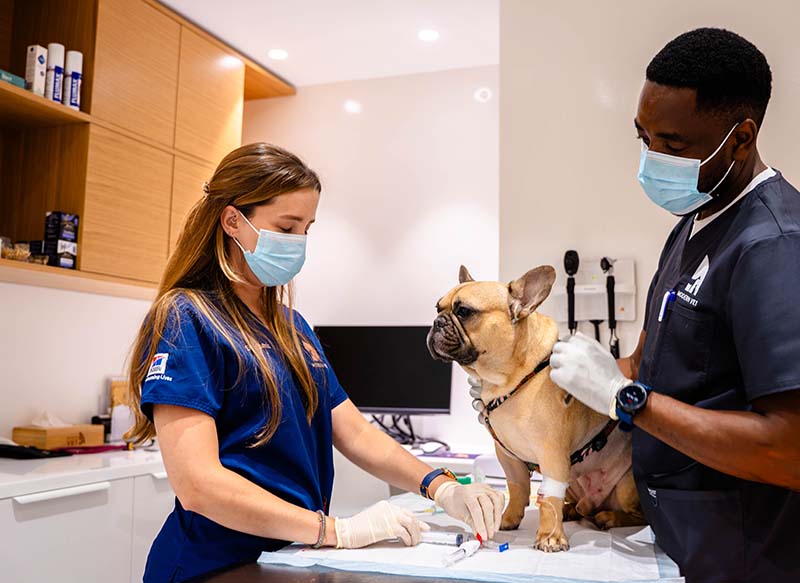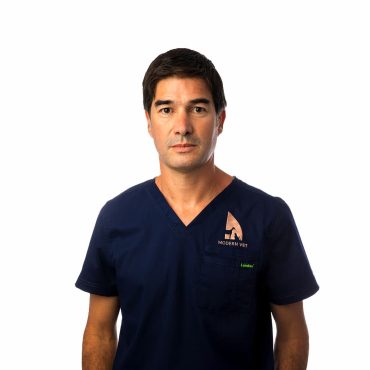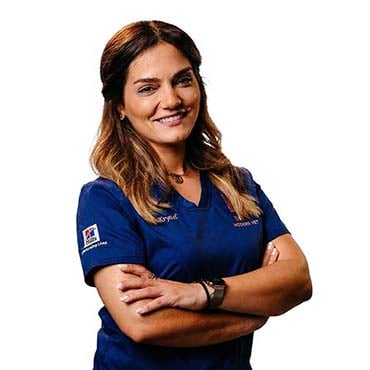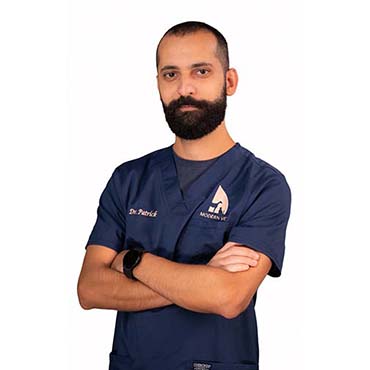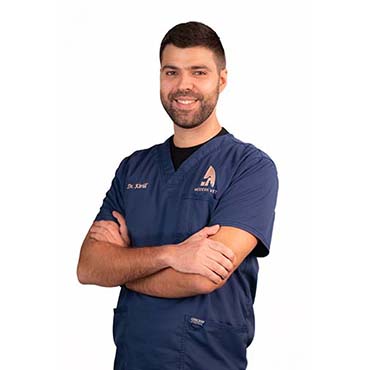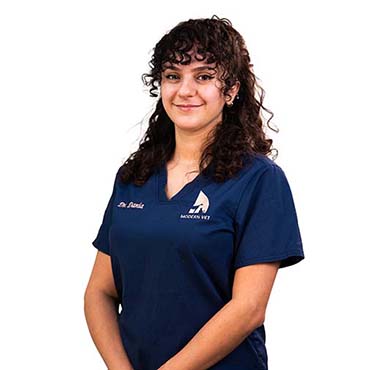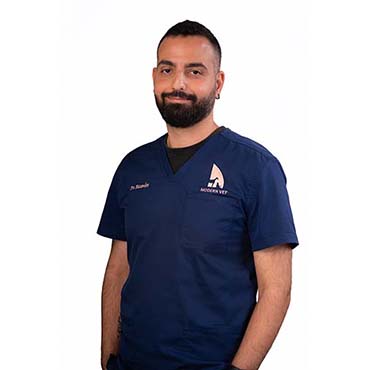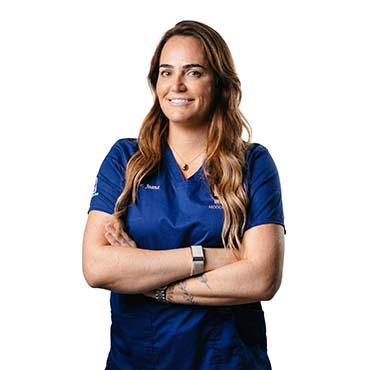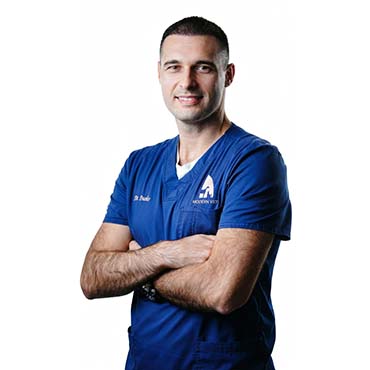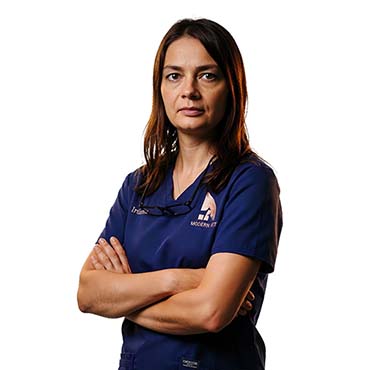Cancer is one of the most significant health challenges facing pets today, affecting millions of dogs and cats worldwide each year. A cancer diagnosis for your beloved companion can be pretty daunting and emotional, but at Modern Veterinary Hospital, we are here to help you through the process. Our veterinary oncology team can provide hope and care for your pet. As one of the most advanced cancer care centres in the UAE, your pet will have the best chance at a longer and happier life.
Here Are Key Warning Signs That May Indicate Cancer In Your Pet:
Unexplained Lumps Or Bumps
Difficulty Breathing, Urinating, Or Defecating
Sores That Do Not Heal
Lethargy Or Decreased Stamina
Sudden Weight Loss Or Loss Of Appetite
Noticeable Change In Behavior Or Energy Levels
Difficulty Eating Or Swallowing
Abnormal Swelling Or Growths
Bleeding Or Discharge From Any Body Opening
Persistent Coughing Or Difficulty Breathing
Persistent Lameness Or Stiffness
Pain When Touched Or Reluctance To Move

Veterinary Oncology
Veterinary oncology is the branch of veterinary medicine that deals with treating and managing cancer in animals. Like human medicine, no single discipline can be applied to cancer, and veterinary oncologists utilize a range of techniques, including surgery, chemotherapy, targeted therapies, immunotherapy, and palliative care. Our top priorities are controlling/eliminating cancer, controlling pain/discomfort, and maximising quality of life for your pet.
How Common is Cancer in Pets?
Cancer is prevalent in older pets, and sadly, this is a part of life. It is estimated that around 50% of dogs and 30% of cats aged 10 years and older will have a cancer diagnosis in their lifetime. Cancer commonly appears in older animals, but it can also develop in young dogs, affecting any breed, regardless of age. However, an early diagnosis and better cure strategies have permitted the fate of numerous pets with malignancy to be extremely reestablished.
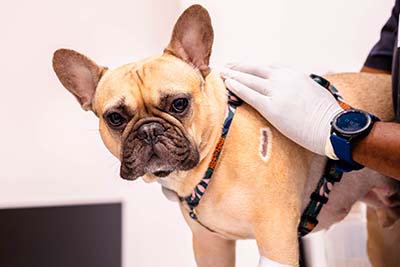
Types of Cancer Commonly Seen in Dogs and Cats
Modern Veterinary Hospital diagnoses and treats a wide range of cancers in pets. There are a variety of general types; the most common ones are:
Lymphoma
Lymphoma is cancer of the lymphatic system and is one of the most common cancers in both dogs and cats. Commonly manifests as lymphadenopathy, weight loss, and lethargy. The standard treatment for this is chemotherapy, which can achieve remission in many cases.
Mast Cell Tumors (MCTs)
Common skin tumors in dogs, particularly in boxers and Labradors. They can range from benign (bubble-like) to aggressive (firmia) and may manifest as firm, raised lumps. The usual treatment is surgery to remove the tumor, sometimes followed targeted therapy.
Osteosarcoma
Osteosarcoma is an aggressive form of bone cancer that primarily occurs in large and giant breed dogs. Of course, lameness may also be swelling and pain near that bone. It is typically treated using amputation of the affected limb along with chemotherapy.
Soft Tissue Sarcomas
These tumors are not cancerous and come from connective tissues. They can be seen as firm yet painless lumps under the skin. In all cases, the main form of treatment involves surgical excision.
Hemangiosarcoma
This tumor is a cancer of blood vessel cells that frequently develops in the spleen or heart, causing the animal to collapse suddenly from internal bleeding. While both surgery and chemotherapy can prolong life expectancy, the prognosis is generally poor.
Mammary (Breast) Cancer
Mammary Tumors – Prevalent in unspayed female dogs and cats, generally benign or malignant. Since early surgical removal provides the best prognosis for cure, and spaying before the first heat cycle significantly reduces risk.
Oral Tumors
Tumors such as squamous cell carcinoma and malignant melanoma that are found in the mouth can lead to halitosis, bleeding, and trouble eating. The treatment includes surgery and occasionally chemotherapy.
Cancer Care Services Offered At A Veterinary Oncology Clinic Include:
Comprehensive Cancer Screenings
Advanced Oncology Treatment Options
In-Depth Diagnostic Imaging (X-Ray, CT, MRI)
Targeted Therapies And Immunotherapy
Biopsy And Cytology Services
Palliative And Pain Management Care
Blood And Urine Cancer Marker Testing
Nutritional And Supportive Care Plans
Surgical Tumor Removals
Individualized Cancer Treatment Planning
Chemotherapy Treatments
Oncology Follow-Up And Quality-Of-Life Monitoring

Recognising Early Signs of Cancer in Pets
The best outcomes for treatment are achieved through early detection. Pet owners should watch for:
● Unexplained lumps or bumps
● Sores that do not heal
● Sudden weight loss or loss of appetite
● Difficulty eating or swallowing
● Bleeding or discharge from any body opening
● Persistent lameness or stiffness
● Difficulty breathing, urinating, or defecating
● Lethargy or decreased stamina
If you see any of these symptoms, take your dog to the vet immediately. When treatment is initiated early, it can lead to a higher chance of success and a better quality of life.
Advanced Diagnostics at Modern Veterinary Hospital
A precise diagnosis is the foundation of proficient cancer treatment. Modern Veterinary Hospital has the latest diagnostic technologies available to help diagnose and stage your pet’s cancer:
● Physical Examination: Thorough palpation of lumps, lymph nodes, and a complete body assessment.
● Imaging: Digital X-rays, ultrasound, CT scans, and MRI visualise tumours in detail and assess their spread.
● Biopsy and Cytology: Our expert pathologists collect tissue or cell samples for microscopic analysis.
● Blood and Urine Tests: To evaluate organ function, overall health, and detect cancer markers.
● Staging: Determining if and how far cancer has spread guides treatment planning.
Comprehensive Treatment Options
Each pet and each type of cancer is different. Our oncology team individualises treatment plans by assessing your pet’s type and stage of cancer, age, general health, and your family’s goals.
Surgery
The first line of therapy for solid tumors is usually surgical resection. Our experienced surgeons can perform tumor dissections using the latest technology while minimizing damage to healthy tissue. Sometimes, surgery can be definitive; other times, it’s combined with other therapies.
Chemotherapy
Chemotherapy directly works against systemic cancers such as lymphoma and is an adjunct to surgery. Chemotherapy for dogs is generally well-tolerated and has fewer side effects compared to human medicine. We closely monitor your pet for adverse reactions and adjust protocols as necessary.
Targeted Therapies and Immunotherapy
Newer therapies include targeted therapies and immunotherapies, drugs, or antibodies that specifically attack cancer cells while doing minimal damage to normal cells. Modern Veterinary Hospital offers some of these therapies.
Palliative and Supportive Care
If not, we focus on optimising comfort and quality of life. These can be pain control, nausea medications, appetite stimulants, hospice care, etc.
Prevention and Early Detection
● Spay or Neuter Your Pet: Lowers the incidence of mammary tumors in females and testicular cancer in males. It is most effective if performed before the first heat cycle or in young pets.
● Avoid Exposure to Carcinogens: Avoid exposing pets to inhaling tobacco smoke, as that makes them likely to develop cancer too. Reduce exposure to toxic pesticides, herbicides, and household chemicals.
● Maintain a Healthy Lifestyle: Adjust your dog’s balanced, healthy food plan. Foster regular exercise to achieve or maintain a healthy body weight and maintain immunity
● Schedule Regular Veterinary Wellness Exams: These abnormalities can be detected early on through routine check-ups. Diagnosis at an early stage makes treatment easier and life better.
● Monitor for Unusual Symptoms: Look out for lumps, bumps, weight loss without explanation, lethargy, or behavioural changes. Immediately report any such concerns to your veterinarian for a timely evaluation.
● Educate Yourself on Breed-Specific Risks: Some breeds are more prone to certain cancers. Ask your vet about yours.
● Provide a Safe Environment: Reduce your pet’s exposure to environmental toxins and harmful UV rays.
Following these steps can help reduce your pet’s cancer risk and ensure early intervention if problems arise.
Take the Next Step: Hope and Healing at Modern Veterinary Hospital
Do not wait until your pet is diagnosed with cancer or you see warning signs. And with early intervention and skilled medical attention, this can change the world. At Modern Veterinary Hospital, our commitment is to offer the highest level of modern, humane oncology care available in the UAE, ensuring your pet can enjoy their best day, every day.
Contact Modern Veterinary Hospital today to schedule a cancer care consultation and give your companion the best chance at a healthy, happy future.
FREQUENTLY ASKED QUESTIONS
Learn more about "ONCOLOGY IN PETS"
